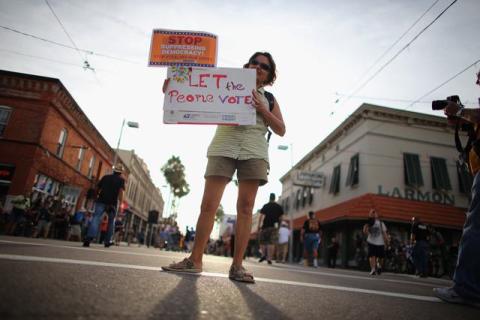FLORIDA - In March 2017, I was asked to assume leadership of the grassroots organization Florida Fair and Open Primaries (FFAOP). The organization was created by Duane Pike, of Tampa, FL in 2012 under another name, but the mission was always to advocate for Florida’s adoption of a top-two open primary. At that time, a couple of events intersected that provided a prime opportunity to build on what Duane had created.
I was introduced to John Opdycke, president of Open Primaries, at Independent Voting's national conference in New York City on a cold, gray day. Back in sunny Florida the state’s Constitution Revision Commission (CRC) was being convened. The CRC is unique to Florida, and is convened every twenty years. It provides the opportunity for citizens to appear before a commission with the power to place proposed constitutional amendments directly on the ballot.
John and I agreed that the commission process would be an ideal vehicle for advancing the cause for open primaries in Florida.
During the commission’s “listening tour” last spring, open primaries was the second most popular issue addressed at public hearings held across the state (second only to the restoration of voting rights of felons, which ultimately made it to this year’s ballot by citizens’ initiative). Florida Fair and Open Primaries was engaged from the beginning.
With assistance from Open Primaries, dozens of speakers appeared before the CRC at public hearings stating their desire for open primaries. Hundreds more submitted written statements of support, and 10,000 signed an online petition. At least two commissioners were listening.
These two commissioners filed proposals related to Florida’s closed primary system. While FFAOP supported both, we preferred the proposal which would have implemented a top two open primary. After I and a representative from Open Primaries travelled to Tallahassee four times to appear before the Ethics and Elections Committee, we were able to get the proposal through one committee, on a 6-3 favorable vote.
Unfortunately, the proposal was shot down six days later in a second committee. The fix was in, but we did not give up.
The commission rules allowed for a proposal killed in committee to be “clawed back,” if a majority of commissioners agreed. During the final round of public hearings, FFAOP again turned out speakers in support, asking that the proposal for a top-two primary be given a full and fair hearing before the full commission. We were rebuffed, but again, we still did not give up.
It was abundantly clear that, like the legislature, partisan political appointees could not be counted on to help provide equal voting rights to 27% of Florida’s electorate. The path forward was equally clear, and over the past six weeks, FFAOP became a certified political committee and is circulating two petitions related to Florida’s closed primary system. One seeks a top-two open primary and the second demands an end to public funding and support for closed private party primaries.
Two former Florida congressmen, Patrick Murphy (D) and David Jolly (R), toured Florida last year holding town hall meetings discussing the broken politics in Washington, D.C. Their talks focused on the “Big 3”: Gerrymandering. Big money in politics. Closed primaries. During Q&A, they often advised those in the audience that citizens have the ability to change things by initiative.
FFAOP took their advice, and they took the initiative to change things in their state. The efforts of Florida Fair and Open Primaries are just one example of a multitude of electoral reform activities being pursued across the country, but if you are interested in our work, you can obtain more information at our website.
